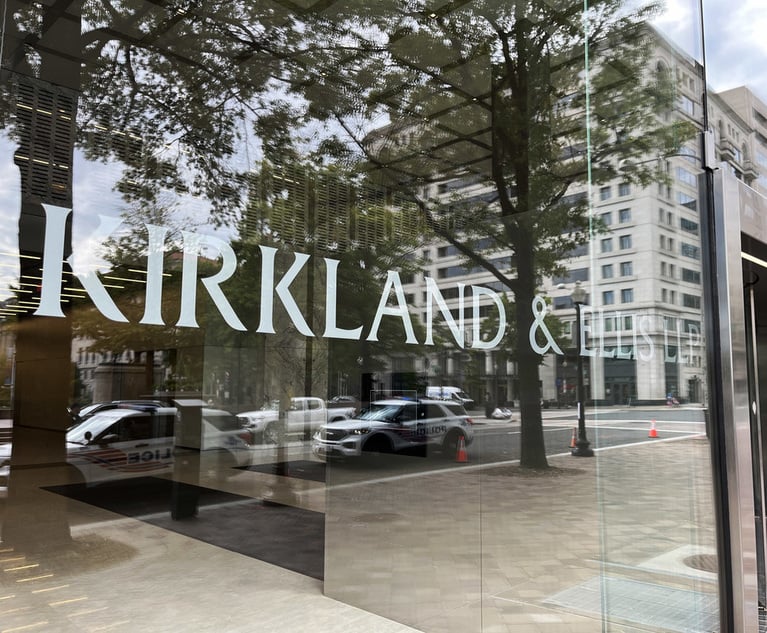Percentage of New Women Partners Rising Slowly; Still Low Compared to Men
The number of women promoted to partner reached a six-year high in 2017, but women still only account for 38.1 percent of all new partners among top law firms, according to a new report.
November 09, 2017 at 05:38 PM
35 minute read

A record number of women made partner in 2017, but female attorneys still lag far behind their male counterparts in promotions to partnership, according to a new report by the Diversity & Flexibility Alliance.
Using data from more than 133 Big Law firms, the report found that women made up 38.1 percent of newly promoted partners—up from 37 percent last year—while men accounted for 61.9 percent of promotions in 2017.
“I still think it shows that there's a lot more work to do,” said Manar Morales, president and CEO of the Diversity & Flexibility Alliance. “Even as it continues to creep up, it's doing it at a pretty glacial pace.”
In 2012—the year the Alliance began collecting its data—roughly 33 percent of newly promoted partners were women. That percentage remained fairly stagnant until 2016, when women accounted for 36 percent of partnership classes.
“We are seeing it going in the right direction, albeit quite slowly,” Morales said. “But it's clear from the trends and numbers that [there's] a lot more to be done.”
One highlight of the report Morales noted was that 43 law firms, or roughly 32 percent of firms surveyed, had new partner classes consisting of more than 50 percent women—the largest since the study began four years ago.
Cravath, Swaine & Moore, Goldberg Kohn, Hunton & Williams, Kramer Levin Naftalis & Frankel and Pepper Hamilton each advanced only women last year.
Firms that had the highest percentage of women promoted included Pillsbury Winthrop Shaw Pittman, which elevated five women among six newly selected partners; Steptoe & Johnson, which promoted four women and one man; and Parker Poe Adams & Bernstein and Paul Hastings, which each elevated three women among four newly elected partners.
Ten firms, however, promoted no women to partnership status. This statistic ties with 2016 for the smallest number of firms with no women in their partnership class.
Fish & Richardson promoted eight men and no women to its partnership. Andrews Kurth Kenyon and Womble Carlyle Sandridge & Rice (which is now Womble Bond Dickinson), elevated four men and no women. Gibbons, Munger, Tolles & Olson, Paul, Weiss, Rifkind, Wharton & Garrison, Shearman & Sterling, and Sullivan & Cromwell each had three promotions—all male.
“Given the amount of focus that firms are putting on diversity and trying to make sure that they get their partnership to look more diverse, I would've expected more growth,” said Alycia Ziarno, a commercial litigation partner at Nixon Peabody's Washington, D.C., office, who was part of the firm's promotional class in 2017 that consisted of seven men and seven women.
When she was up for partnership, Ziarno said that the firm made sure to take into account that some practice groups tended to promote more women than others, and pushed its practices to advance women in all areas.
“We've made the conscious effort as a firm to look at [gender diversity] and that is taken into account as a part of the partnership evaluation in who are the candidates that you're going to promote,” she said.

A record number of women made partner in 2017, but female attorneys still lag far behind their male counterparts in promotions to partnership, according to a new report by the Diversity & Flexibility Alliance.
Using data from more than 133 Big Law firms, the report found that women made up 38.1 percent of newly promoted partners—up from 37 percent last year—while men accounted for 61.9 percent of promotions in 2017.
“I still think it shows that there's a lot more work to do,” said Manar Morales, president and CEO of the Diversity & Flexibility Alliance. “Even as it continues to creep up, it's doing it at a pretty glacial pace.”
In 2012—the year the Alliance began collecting its data—roughly 33 percent of newly promoted partners were women. That percentage remained fairly stagnant until 2016, when women accounted for 36 percent of partnership classes.
“We are seeing it going in the right direction, albeit quite slowly,” Morales said. “But it's clear from the trends and numbers that [there's] a lot more to be done.”
One highlight of the report Morales noted was that 43 law firms, or roughly 32 percent of firms surveyed, had new partner classes consisting of more than 50 percent women—the largest since the study began four years ago.
Firms that had the highest percentage of women promoted included
Ten firms, however, promoted no women to partnership status. This statistic ties with 2016 for the smallest number of firms with no women in their partnership class.
“Given the amount of focus that firms are putting on diversity and trying to make sure that they get their partnership to look more diverse, I would've expected more growth,” said Alycia Ziarno, a commercial litigation partner at
When she was up for partnership, Ziarno said that the firm made sure to take into account that some practice groups tended to promote more women than others, and pushed its practices to advance women in all areas.
“We've made the conscious effort as a firm to look at [gender diversity] and that is taken into account as a part of the partnership evaluation in who are the candidates that you're going to promote,” she said.
This content has been archived. It is available through our partners, LexisNexis® and Bloomberg Law.
To view this content, please continue to their sites.
Not a Lexis Subscriber?
Subscribe Now
Not a Bloomberg Law Subscriber?
Subscribe Now
NOT FOR REPRINT
© 2025 ALM Global, LLC, All Rights Reserved. Request academic re-use from www.copyright.com. All other uses, submit a request to [email protected]. For more information visit Asset & Logo Licensing.
You Might Like
View All
T14 Sees Black, Hispanic Law Student Representation Decline Following End of Affirmative Action

Fired Kirkland Associate's Gender Bias Lawsuit to Enter Private Mediation

Duane Morris Uses Nonequity Partnership as 'Income Shifting' Device, Class Action Contends
5 minute read
Diversity Pros Hope Work Allocation Offers a Key to Building Inclusive Law Firms
5 minute readTrending Stories
- 1A&O Shearman Lost 15 Asia Partners in a Year
- 2Spin-Off Firm Leaves Reed Smith Without Richmond Lobbying Practice
- 3DC's Birchstone Moore Combines With Chicago-Founded Wealth Planning Firm
- 4White Castle GC Becomes Chain's First President From Outside Family
- 5Braverman Greenspun Acquires NY Real Estate Boutique
Who Got The Work
Michael G. Bongiorno, Andrew Scott Dulberg and Elizabeth E. Driscoll from Wilmer Cutler Pickering Hale and Dorr have stepped in to represent Symbotic Inc., an A.I.-enabled technology platform that focuses on increasing supply chain efficiency, and other defendants in a pending shareholder derivative lawsuit. The case, filed Oct. 2 in Massachusetts District Court by the Brown Law Firm on behalf of Stephen Austen, accuses certain officers and directors of misleading investors in regard to Symbotic's potential for margin growth by failing to disclose that the company was not equipped to timely deploy its systems or manage expenses through project delays. The case, assigned to U.S. District Judge Nathaniel M. Gorton, is 1:24-cv-12522, Austen v. Cohen et al.
Who Got The Work
Edmund Polubinski and Marie Killmond of Davis Polk & Wardwell have entered appearances for data platform software development company MongoDB and other defendants in a pending shareholder derivative lawsuit. The action, filed Oct. 7 in New York Southern District Court by the Brown Law Firm, accuses the company's directors and/or officers of falsely expressing confidence in the company’s restructuring of its sales incentive plan and downplaying the severity of decreases in its upfront commitments. The case is 1:24-cv-07594, Roy v. Ittycheria et al.
Who Got The Work
Amy O. Bruchs and Kurt F. Ellison of Michael Best & Friedrich have entered appearances for Epic Systems Corp. in a pending employment discrimination lawsuit. The suit was filed Sept. 7 in Wisconsin Western District Court by Levine Eisberner LLC and Siri & Glimstad on behalf of a project manager who claims that he was wrongfully terminated after applying for a religious exemption to the defendant's COVID-19 vaccine mandate. The case, assigned to U.S. Magistrate Judge Anita Marie Boor, is 3:24-cv-00630, Secker, Nathan v. Epic Systems Corporation.
Who Got The Work
David X. Sullivan, Thomas J. Finn and Gregory A. Hall from McCarter & English have entered appearances for Sunrun Installation Services in a pending civil rights lawsuit. The complaint was filed Sept. 4 in Connecticut District Court by attorney Robert M. Berke on behalf of former employee George Edward Steins, who was arrested and charged with employing an unregistered home improvement salesperson. The complaint alleges that had Sunrun informed the Connecticut Department of Consumer Protection that the plaintiff's employment had ended in 2017 and that he no longer held Sunrun's home improvement contractor license, he would not have been hit with charges, which were dismissed in May 2024. The case, assigned to U.S. District Judge Jeffrey A. Meyer, is 3:24-cv-01423, Steins v. Sunrun, Inc. et al.
Who Got The Work
Greenberg Traurig shareholder Joshua L. Raskin has entered an appearance for boohoo.com UK Ltd. in a pending patent infringement lawsuit. The suit, filed Sept. 3 in Texas Eastern District Court by Rozier Hardt McDonough on behalf of Alto Dynamics, asserts five patents related to an online shopping platform. The case, assigned to U.S. District Judge Rodney Gilstrap, is 2:24-cv-00719, Alto Dynamics, LLC v. boohoo.com UK Limited.
Featured Firms
Law Offices of Gary Martin Hays & Associates, P.C.
(470) 294-1674
Law Offices of Mark E. Salomone
(857) 444-6468
Smith & Hassler
(713) 739-1250








